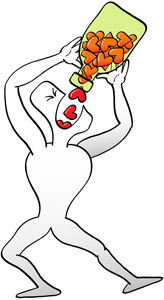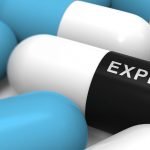On October 15th, the New England Journal of Medicine published a study titled, “Emergency Department Visits for Adverse Events Related to Dietary Supplements.”1 Andrew I. Geller, Nadine Shehab, et al. “Emergency Department Visits for Adverse Events Related to Dietary Supplements.” N Engl J Med 2015; 373:1531-1540. http://www.nejm.org/doi/pdf/10.1056/NEJMsa1504267
In summary, based on an analysis of 3667 cases, the study concluded/estimated that 23,005 emergency room visits each year are the result of adverse reactions to dietary supplements. They further estimated that these visits resulted in an estimated 2154 hospitalizations annually. Specifically, they stated that almost half these incidents involved young adults between the ages of 20 and 34 (28.0% of visits) and children (21.2% of visits)–proving, as they said, how dangerous supplements are since the young and healthy are being affected.
Couple this report with the case of ex- player Lamar Odom, who was on life support for a number of days after using herbal Viagra and collapsing in a Nevada brothel. Sure, he consumed 10 times the recommended dose of the supplement and apparently was on a multi-day cocaine bender as well,2 Javier Panzar , Michael Muskal, and Matt Pearce. “Lamar Odom took cocaine and 10 doses of a Viagra-like medication, sheriff says.” Los Angeles Times. October 14, 2005. (Accessed 19 Oct 2015.) http://www.latimes.com/sports/sportsnow/la-sp-lamar-odom-las-vegas-brothel-20151013-story.html but what everyone remembers from the stories is that it was the herbal Viagra “what done him in,” and that’s the lead most stories ran with.3 Michael E. Miller and Justin Wm. Moyer. “‘Herbal Viagra’ pills linked to Lamar Odom collapse were subject of FDA warning.” The Washington Post. October 15 (Accessed 19 Oct 2015.) http://www.washingtonpost.com/news/morning-mix/wp/2015/10/15/herbal-viagra-pills-linked-to-lamar-odom-collapse-were-subject-of-fda-warning/ , 4 Kirsten Fleming and Jane Ridley. “Lamar Odom and the dark side of herbal Viagra.” New York Post. October 15, 2015. (Accessed 19 Oct 2015.) http://nypost.com/2015/10/15/lamar-odom-and-the-hidden-dangers-of-knockoff-viagra/
Needless to say, with everything going on, the headlines for the stories about the new study have not been kind to dietary supplements over the last several weeks. For example:
- “A new study just revealed something disturbing about those ‘all natural’ dietary supplements that enhance weight loss.” Business Insider, Science.5 Gene Emery, Reuters. “A new study just revealed something disturbing about those ‘all natural’ dietary supplements that enhance weight loss.” Business Insider. (Accessed 15 Oct 2015.) http://www.businessinsider.com/r-health-supplements-send-23000-to-emergency-rooms-in-us-each-year-2015-10
- “”Health” Supplements Send 23,000 to Emergency Rooms in the U.S Each Year.” Scientific American.6 Gene Emery, Reuters. “”Health” Supplements Send 23,000 to Emergency Rooms in the U.S Each Year.” Scientific American. October 15, 2015. (Accessed 15 Oct 2015.) http://www.scientificamerican.com/article/health-supplements-send-23-000-to-emergency-rooms-in-the-u-s-each-year/
- “Dietary Supplements Lead to 20,000 E.R. Visits Yearly, Study Finds.” The New York Times.7 Anahad O’Connor. “Dietary Supplements Lead to 20,000 E.R. Visits Yearly, Study Finds.” The New York Times. October 14, 2015. (Accessed 15 Oct 2015.) http://well.blogs.nytimes.com/2015/10/14/dietary-supplements-lead-to-20000-e-r-visits-yearly-study-finds
- “Dietary supplements cause 23,000 ER visits, FDA still does not regulate industry.” Morning Ticker.8 Kerry Sullivan. “Dietary supplements cause 23,000 ER visits, FDA still does not regulate industry.” Morning Ticker. October 15, 2015. (Accessed 15 Oct 2015.) http://www.morningticker.com/2015/10/dietary-supplements-cause-23000-er-visits-fda-still-does-not-regulate-industry/
Now you would think that these headlines are based on reporters actually reading the study, wouldn’t you? But you would be wrong–and that’s true even of reputable journals such as Scientific American. In most cases, what happened is that the media picked up the report from a Reuters release that announced the results of the study–after inserting the Reuters reporter’s own spin on the data, which was not kind to supplements. Then the different magazines did a minor rewrite on the Reuters article to make it “look” original, finishing it off with a provocative headline–all the while keeping in the original articles anti-supplement bias. Don’t believe me? Check out the links to the first two headlines above from Business Insider and Scientific American. Notice how the articles are remarkably similar, with minor tweaks. In fact, start with the second paragraph in the articles and they’re virtually identical. Deep, deep sigh! How low journalism has sunk.
In fact, the study is available for anyone to read. And when you actually read it, you will find that although the media has accurately “quoted” selected facts from the study, they have totally “misrepresented” what the study’s data actually shows–big time. Let’s take a look.
What the Reuters Release Says the Study Says
Reuters is important because so many media outlets simply accepted their article as fact and reprinted it under their banner with some minor cosmetic tweaks. Amazingly, what looks like multiple news sources independently reporting on a story is really one biased story being reused over and over and over again. Let’s take a look at some of the statements that came out of the Reuters newswire feed and see how they stack up against reality.
“Dietary supplements send 23,000 people, many of them children, to the emergency room in the U.S. each year, according to a new estimate.”
- What Reuters wants you to walk away with: Dietary supplements are dangerous, even deadly.
 The reality: First of all, emergency room visits does not mean deaths. In fact, almost no one dies from using dietary supplements. These 20,000 incidents so dramatically cited include things such as seniors feeling discomfort from being unable to properly swallow their pills or feeling that they have a lump in their throats after trying to swallow their pills. It also includes small children getting access to carelessly stored bottles and downing a number of pills, but unsupervised children will do the same thing with cleaning products and alcoholic beverages if given a chance. Yes, some people had events involving palpitations, chest pain, and tachycardia, but over 70% of those incidents involved weight-loss and energy supplements. For perspective, it should be noted that prescription drugs are responsible for over 700,000 trips to the emergency room each year.9 Budnitz DS, Pollock DA, Weidenbach KN, et al. “National surveillance of emergency department visits for outpatient adverse drug events.” JAMA. 2006 Oct 18;296(15):1858-66. http://www.ncbi.nlm.nih.gov/pubmed/17047216 In fact, according to the Journal of the American Medical Association, prescription drugs are responsible for 76,000 -137,000 deaths a year.10 Lazarou J, Pomeranz, Corey PN. “Incidence of Adverse Drug Reactions in Hospitalized Patients: A Meta-analysis of Prospective Studies.” JAMA. 1998;279(15):1200-1205. http://jama.jamanetwork.com/article.aspx?articleid=187436 And that’s only talking about death as a side effect from “properly prescribed” meds; it does not factor in physician error in prescribing those drugs or pharmacy error in filling the prescription. Add in those factors, and the numbers climb much, much higher.
The reality: First of all, emergency room visits does not mean deaths. In fact, almost no one dies from using dietary supplements. These 20,000 incidents so dramatically cited include things such as seniors feeling discomfort from being unable to properly swallow their pills or feeling that they have a lump in their throats after trying to swallow their pills. It also includes small children getting access to carelessly stored bottles and downing a number of pills, but unsupervised children will do the same thing with cleaning products and alcoholic beverages if given a chance. Yes, some people had events involving palpitations, chest pain, and tachycardia, but over 70% of those incidents involved weight-loss and energy supplements. For perspective, it should be noted that prescription drugs are responsible for over 700,000 trips to the emergency room each year.9 Budnitz DS, Pollock DA, Weidenbach KN, et al. “National surveillance of emergency department visits for outpatient adverse drug events.” JAMA. 2006 Oct 18;296(15):1858-66. http://www.ncbi.nlm.nih.gov/pubmed/17047216 In fact, according to the Journal of the American Medical Association, prescription drugs are responsible for 76,000 -137,000 deaths a year.10 Lazarou J, Pomeranz, Corey PN. “Incidence of Adverse Drug Reactions in Hospitalized Patients: A Meta-analysis of Prospective Studies.” JAMA. 1998;279(15):1200-1205. http://jama.jamanetwork.com/article.aspx?articleid=187436 And that’s only talking about death as a side effect from “properly prescribed” meds; it does not factor in physician error in prescribing those drugs or pharmacy error in filling the prescription. Add in those factors, and the numbers climb much, much higher.
“The supplements include herbal products, amino acids, vitamins, minerals, and other complementary nutrition products hawked for a wide range of uses, often with little or no testing to back up claims.”
- What Reuters wants you to walk away with: If it’s a dietary supplement, any kind of dietary supplement, it’s dangerous.
- The reality: Again, over 70% of the serious incidents involve just two classes of supplements–energy and diet. And how many of those involved significant abuse–not to mention mixing with other stimulants such as multiple energy drinks and cups of coffee a day? On the other hand, how many people OD on vitamin pills and antioxidants? Not all supplements are equally questionable. PS: if you have any doubt about the bias of the Reuters article, you can pretty much put that to bed with its use of the word “hawked” which equates supplements with nostrums sold by street vendors and carnival barkers. Really?
“Among the injuries cited were severe allergic reactions, heart trouble, nausea and vomiting, which were tied to a broad variety of supplements including herbal pills, amino acids, vitamins and minerals.”
- What Reuters wants you to walk away with: The dangers of supplements are wide ranging and are inherent in all supplements.
- The reality: Yes, there were incidents for these things, but they involved very small percentages–and in terms of how many actually had to go to the hospital, you end up with numbers you can count on your fingers.
“The new study “illustrates the idea that something that’s ‘natural’ is not necessarily safe, and these products do not come without risk,” Dr. Curtis Haas, director of pharmacy for the University of Rochester Medical Center and a past president of the American College of Clinical Pharmacy, told Reuters Health. He was not involved in the research.”
- What Reuters wants you to walk away with: If it’s natural, it’s dangerous.
- The reality: No, supplements are not inherently dangerous, but they can be powerful. Look, you can’t have it both ways. You can’t claim that natural supplements are useless and have no benefits beyond a placebo effect, which is the primary position of the establishment as evidenced by study after study slamming the efficacy of natural substances. And then, in the same breath, claim that natural substances are so powerful they’re unsafe. Are these people really trying to say that everything in nature is designed to harm you–and by implication, the only things that can improve your health are patented, highly expensive, side-effect-riddled, pharmaceutical drugs. How convenient–and idiotic!
“Congress has thwarted attempts to strictly regulate the $14.8 billion industry.”
- What Reuters wants you to walk away with: Congress is controlled by the supplement industry.
 The reality: Congress is controlled by the medical industry and large corporations, not the supplement industry. The natural supplement industry may be large–according to the CDC over half the adult population uses dietary supplements11 Jaime Gahche, Regan Bailey, Vicki Burt, et al. “Dietary Supplement Use Among U.S. Adults Has Increased Since NHANES III (1988–1994).” NCHS Data Brief Number 61, April 2011. http://www.cdc.gov/nchs/data/databriefs/db61.htm –but it does not speak with one voice. And more importantly, whatever voice it has does not speak with huge amounts of money behind it. Have you ever heard anyone talk about the power of the natural supplement lobby? Have you ever heard about how much the supplement industry contributes to political campaigns? On the other hand, big pharma earns billions and billions and billions of dollars every year.12 “Top 25 pharma companies by global sales.” PMLiVE 2014. (Accessed 18 Oct 2015.) http://www.pmlive.com/top_pharma_list/global_revenues And out of all those billions, according to a study published in the BMJ, for every dollar spent on research, 19 dollars are spent on self-promotion and lobbying.13 Donald W Light, Joel R Lexchin. “Pharmaceutical research and development: what do we get for all that money?” BMJ 2012;345:e4348. http://www.bmj.com/content/345/bmj.e4348 To make that even clearer, 95% of the money earned by big pharma goes to marketing and lobbying!!! Let’s get real here. Congress is not controlled by the supplement industry. It’s controlled by the enemies of the supplement industry. Oh, and “thwarted” is yet another bias-laden language choice in the Reuters article.
The reality: Congress is controlled by the medical industry and large corporations, not the supplement industry. The natural supplement industry may be large–according to the CDC over half the adult population uses dietary supplements11 Jaime Gahche, Regan Bailey, Vicki Burt, et al. “Dietary Supplement Use Among U.S. Adults Has Increased Since NHANES III (1988–1994).” NCHS Data Brief Number 61, April 2011. http://www.cdc.gov/nchs/data/databriefs/db61.htm –but it does not speak with one voice. And more importantly, whatever voice it has does not speak with huge amounts of money behind it. Have you ever heard anyone talk about the power of the natural supplement lobby? Have you ever heard about how much the supplement industry contributes to political campaigns? On the other hand, big pharma earns billions and billions and billions of dollars every year.12 “Top 25 pharma companies by global sales.” PMLiVE 2014. (Accessed 18 Oct 2015.) http://www.pmlive.com/top_pharma_list/global_revenues And out of all those billions, according to a study published in the BMJ, for every dollar spent on research, 19 dollars are spent on self-promotion and lobbying.13 Donald W Light, Joel R Lexchin. “Pharmaceutical research and development: what do we get for all that money?” BMJ 2012;345:e4348. http://www.bmj.com/content/345/bmj.e4348 To make that even clearer, 95% of the money earned by big pharma goes to marketing and lobbying!!! Let’s get real here. Congress is not controlled by the supplement industry. It’s controlled by the enemies of the supplement industry. Oh, and “thwarted” is yet another bias-laden language choice in the Reuters article.
“What’s most concerning is the age of people coming in with cardiovascular complications or symptoms,” Dr. Haas said. “They are in their 20s to 30s, which shows there are risks to these products.”
- What Reuters wants you to walk away with: If young, healthy people are experiencing these problems, it just shows how dangerous supplements truly are.
- The reality: No, it doesn’t show that at all. It shows that young people tend to overdo things–especially with energy products and diet products. How many of them take double, triple, or quadruple the recommended dose? How many compound the problem by slugging down multiple energy drinks and multiple double espressos to keep them going throughout the day? It’s not a supplement problem; it’s a substance abuse problem. The bottom line is that being young is almost synonymous with bad judgment. Hey, I know. I’ve been there–done that.
“”The number of emergency department visits attributed to supplement-related adverse events that we identified is probably an underestimation, since supplement use is underreported by patients, and physicians may not identify adverse events associated with supplements as often as they do those associated with pharmaceuticals,” the researchers said.”
- What Reuters wants you to walk away with: as dangerous as we’ve so far led you to believe supplements are to this point in the article, it’s actually much, much worse.
- The reality: To be fair, let’s subtract out children who get hold of a carelessly placed bottle, seniors who have trouble swallowing anything, and young people jacking themselves up on massive doses of caffeine. We subtract those out because they have nothing to do with the inherent safety of the supplements in question. What you are left with is numbers that are a fraction of what you find with the use of prescription drugs and almost no deaths vs somewhere around 100,000 deaths a year for prescription drugs–very, very conservatively speaking.
There is no question what conclusion you are supposed to draw after reading the Reuters report: that all supplements are dangerous, even deadly, and that they need to be brought under regulatory control ASAP. Certainly most of the media ran with that message, even journals such as Scientific American that should know better.
Conclusion
Are the cited numbers (23,000 incidents) real? Of course they are; they just don’t mean what everyone is trying to make them mean. Let’s summarize what the study actually says to put things in perspective.
- Prescription drugs are 35 times more likely to send you to the hospital than supplements, and exponentially, even astronomically, more likely to kill you than supplements–and that’s with some 150 million regular supplement users.
- Twenty-eight percent of those are young people who are abusing energy supplements and diet pills, along with alcohol, energy drinks, and recreational drugs.
- Twenty-one percent are the result of unsupervised children doing what unsupervised children do.
- Thirty-seven percent are the result of seniors having difficulty swallowing their pills–but that’s a common condition among seniors and is entirely unconnected to whether or not herbal or nutraceutical supplements are involved.
- In total, that’s 86% of all the incidents cited!!! That leaves you about 280 incidents and three hospital admissions a year among 150,000,000 users. Food should be that safe. (The CDC estimates that each year roughly 1 in 6 Americans (or 48 million people) get sick, 128,000 are hospitalized, and 3,000 die of foodborne diseases.14 “CDC Estimates of Foodborne Illness in the United States.” CDC April 17, 2014. (Accessed 18 Oct 2015.) http://www.cdc.gov/foodborneburden/estimates-overview.html )
As the Council for Responsible Nutrition said in the Reuters article when responding to this study, the results “reinforce that dietary supplements are safe products, particularly when put into the context with the number of people– over 150 million Americans–who take dietary supplements every year.”
In summary, there’s nothing wrong with the study itself, or even the numbers it cites, but the way those numbers have been manipulated to produce totally misleading conclusions is beyond the pale. It is just one more in a series of dirty punches the supplement industry has been subjected to over the last 24 months. Incidentally, this was a major topic of discussion among industry leaders at the Supplyside West show earlier this month. The supplement industry knows it’s under attack and is very concerned. As the old saying goes, “Just because you’re paranoid doesn’t mean somebody’s not out to get you.”
Look, are there companies that use cheap ingredients to make virtually useless supplements? Of course there are. But these are not drugs; they are not designed to—and should not be expected to—treat serious conditions. We’re talking about essentially useless vitamins and antioxidants. No special regulation is needed. Eventually, the marketplace will work it out, and people will stop buying them. On the other hand, are there supplement companies—especially those making diet and sex pills—that jack up their formulas with amphetamine like substances—sometimes not even listed on the label? Absolutely, but that’s already illegal and is already covered by cGMP. As a consumer, you should only buy from companies that clearly state they are following Good Manufacturing Practices. And keep in mind that both pharmaceutical companies and food manufacturers have been found guilty of doing the same thing. But, and this is a very important “but” to keep in mind, the number of people who have died from poorly made and falsely tested pharmaceutical drugs, not to mention contaminated foods, is infinitely higher than those who have died from bad supplements. By the way, when I say infinitely, that statement is literally true: there were 0 reported deaths from supplements in the US in 2014. In truth, the vast majority of established supplement companies make clean products that work somewhere between well and spectacularly well. If you don’t buy from them, but rather buy weight-loss and sex supplements that promise you miraculous results from a company you’ve never heard of except on the internet or a TV ad, then that’s on you. But even then, your chances of suffering a serious injury are close to zero.

References
| ↑1 | Andrew I. Geller, Nadine Shehab, et al. “Emergency Department Visits for Adverse Events Related to Dietary Supplements.” N Engl J Med 2015; 373:1531-1540. http://www.nejm.org/doi/pdf/10.1056/NEJMsa1504267 |
|---|---|
| ↑2 | Javier Panzar , Michael Muskal, and Matt Pearce. “Lamar Odom took cocaine and 10 doses of a Viagra-like medication, sheriff says.” Los Angeles Times. October 14, 2005. (Accessed 19 Oct 2015.) http://www.latimes.com/sports/sportsnow/la-sp-lamar-odom-las-vegas-brothel-20151013-story.html |
| ↑3 | Michael E. Miller and Justin Wm. Moyer. “‘Herbal Viagra’ pills linked to Lamar Odom collapse were subject of FDA warning.” The Washington Post. October 15 (Accessed 19 Oct 2015.) http://www.washingtonpost.com/news/morning-mix/wp/2015/10/15/herbal-viagra-pills-linked-to-lamar-odom-collapse-were-subject-of-fda-warning/ |
| ↑4 | Kirsten Fleming and Jane Ridley. “Lamar Odom and the dark side of herbal Viagra.” New York Post. October 15, 2015. (Accessed 19 Oct 2015.) http://nypost.com/2015/10/15/lamar-odom-and-the-hidden-dangers-of-knockoff-viagra/ |
| ↑5 | Gene Emery, Reuters. “A new study just revealed something disturbing about those ‘all natural’ dietary supplements that enhance weight loss.” Business Insider. (Accessed 15 Oct 2015.) http://www.businessinsider.com/r-health-supplements-send-23000-to-emergency-rooms-in-us-each-year-2015-10 |
| ↑6 | Gene Emery, Reuters. “”Health” Supplements Send 23,000 to Emergency Rooms in the U.S Each Year.” Scientific American. October 15, 2015. (Accessed 15 Oct 2015.) http://www.scientificamerican.com/article/health-supplements-send-23-000-to-emergency-rooms-in-the-u-s-each-year/ |
| ↑7 | Anahad O’Connor. “Dietary Supplements Lead to 20,000 E.R. Visits Yearly, Study Finds.” The New York Times. October 14, 2015. (Accessed 15 Oct 2015.) http://well.blogs.nytimes.com/2015/10/14/dietary-supplements-lead-to-20000-e-r-visits-yearly-study-finds |
| ↑8 | Kerry Sullivan. “Dietary supplements cause 23,000 ER visits, FDA still does not regulate industry.” Morning Ticker. October 15, 2015. (Accessed 15 Oct 2015.) http://www.morningticker.com/2015/10/dietary-supplements-cause-23000-er-visits-fda-still-does-not-regulate-industry/ |
| ↑9 | Budnitz DS, Pollock DA, Weidenbach KN, et al. “National surveillance of emergency department visits for outpatient adverse drug events.” JAMA. 2006 Oct 18;296(15):1858-66. http://www.ncbi.nlm.nih.gov/pubmed/17047216 |
| ↑10 | Lazarou J, Pomeranz, Corey PN. “Incidence of Adverse Drug Reactions in Hospitalized Patients: A Meta-analysis of Prospective Studies.” JAMA. 1998;279(15):1200-1205. http://jama.jamanetwork.com/article.aspx?articleid=187436 |
| ↑11 | Jaime Gahche, Regan Bailey, Vicki Burt, et al. “Dietary Supplement Use Among U.S. Adults Has Increased Since NHANES III (1988–1994).” NCHS Data Brief Number 61, April 2011. http://www.cdc.gov/nchs/data/databriefs/db61.htm |
| ↑12 | “Top 25 pharma companies by global sales.” PMLiVE 2014. (Accessed 18 Oct 2015.) http://www.pmlive.com/top_pharma_list/global_revenues |
| ↑13 | Donald W Light, Joel R Lexchin. “Pharmaceutical research and development: what do we get for all that money?” BMJ 2012;345:e4348. http://www.bmj.com/content/345/bmj.e4348 |
| ↑14 | “CDC Estimates of Foodborne Illness in the United States.” CDC April 17, 2014. (Accessed 18 Oct 2015.) http://www.cdc.gov/foodborneburden/estimates-overview.html |












Thanks for this. Nicely
Thanks for this. Nicely written and cogently argued, as usual. I wonder if you’ve sent a link to Reuters and the authors at NEJM.
I can’t find anything to quarrel with… except the “you’re” in the last sentence. Proofing vigilance tends to flag near the end of a long paragraph!
Glad you liked the newsletter
Glad you liked the newsletter. Thanks for catching the typo; we fixed it. No matter how hard we try to catch them all, every now and then one slips through.
Thank you for making
Thank you for making corrections to the wrong conclusions that the media wants to sensationalize.
What a gifted researcher and
What a gifted researcher and writer you are! Thank you for countless insightful articles that look behind the BS to shine light on what is real and true.
Too bad so many are driven by their own fear and willingness to take the headlines as the final word, particularly when anyone mentions “a study” — Ha!
As one small example in a sea of examples: I’m sure there was some study, or a bunch of them, decades ago about hydrogenated fats being A-OK. “Avoid the deadly butter, get your margarine here!” the headlines read.
Funny, now the studies say the exact opposite, and trans fats have finally been banned.
Common sense and analytical thinking seem to be lost, with so many wanting some expert to tell them certain truths. It makes me nuts…
But I digress… Thank you, Jon, for doing what you do. I wish your voice could be heard in the headlines!
Well wishes,
Lauren
I think a basic understanding
I think a basic understanding of who owns and controls the media puts everything in a clearer picture.
Wonderful analysis! I’m
Wonderful analysis! I’m continually impressed with the quality of the written material and products offered. Well done!